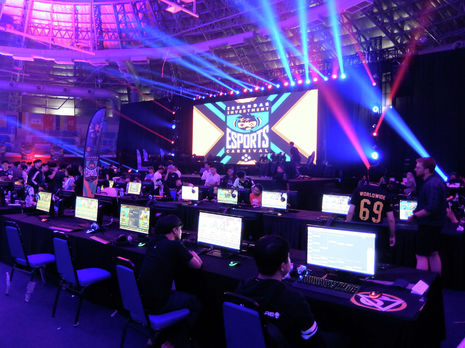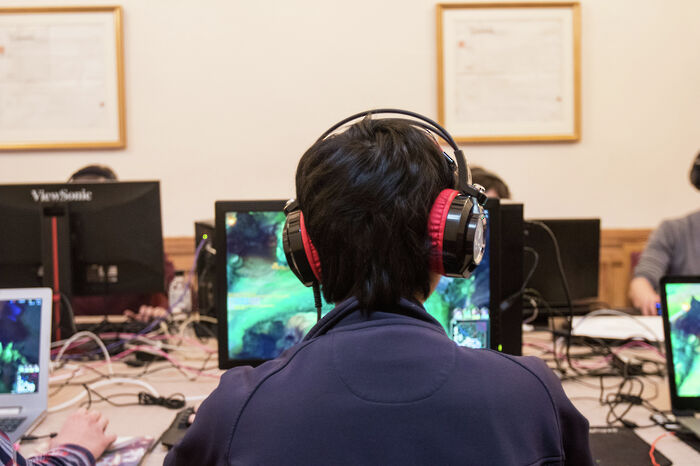Esports: the future of sporting competition
Following significant financial growth and booming online popularity, Zakariyya Ali explores the rise of video gaming as an unconventional form of sport

If you’ve ever picked up a controller and gone head-to-head with a completely random opponent somewhere across the globe, or faced your mate on a game of FIFA in the living room for the all-important prize of bragging rights, you’re probably familiar with the competitive nature of video gaming.
Esports, also known as electronic sports, is an intriguing addition to the family of sporting competition, as it has always contended with accusations surrounding its authenticity as a sport. In 2014, ESPN’s then-President John Skipper labelled competitive gaming “not a sport, [but merely] a competition”. Of course, such a sentiment would come naturally to a business tycoon steeped in the world of showcasing conventional athletic competitions. Yet, just two years later, ESPN went on to acquire broadcasting rights for esports, having glanced at its rising popularity on various live-streaming platforms. Boasting an estimated audience of over 700 million this year, and a revenue just shy of $1.1 billion, it’s hard to argue against the fact that esports is an emerging industry that warrants recognition.
“the time is ripe for international sporting bodies to take heed of an esports revolution that has already turned the heads of ESPN, Disney, and ABC”
From humble beginnings in 1972, the earliest known video game competition took place at America’s Stanford University, where students were invited to an “Intergalactic Spacewar Olympics” with the lucrative grand prize of a year’s subscription to Rolling Stone. Nearly half a century on, the world of competitive gaming has surpassed itself year-by-year with exponential growth. In 2019, more than $211 million was awarded across over 4,000 tournaments, with Fortnite claiming a total prize pool of $64.4 million and Kyle “Bugha” Giersdorf pocketing $3 million from a single competition alone. It should come as no surprise that media giants such as Disney are battling it out for their own piece of the esports pie.
Alongside financial prosperity, esports is becoming increasingly likened to traditional sports in terms of the physical activity demanded of its athletes. China was one of the first countries to recognise esports as an official sports programme in 2003, laying the groundwork for the industry’s heightened public awareness. Ten years later, the sport’s credibility was further bolstered when Canadian League of Legends player Danny “Shiphtur” Le became the first professional gamer to receive an American P-1A visa, a category designated for “internationally recognised athletes”. Momentum didn’t stop there, as the International Olympic Committee (IOC) acknowledged the growing popularity of esports at the 2017 Olympic Summit, concluding that “competitive esports could be considered as a sporting activity, and the players involved prepare and train with an intensity which may be comparable to athletes in traditional sports”.
“there is very little to financially separate virtual sports from powerhouses in the traditional world of sporting competition”
More recently, the IOC announced its first ever Olympic Virtual Series, which ran in the buildup to this year’s Tokyo Games and brought together a partnership between International Sports Federations and game publishers. IOC President Thomas Bach explained: “the Olympic Virtual Series is a new, unique Olympic digital experience that aims to grow direct engagement with new audiences in the field of virtual sports”. He added: “it encourages sports participation and promotes the Olympic values, with a special focus on youth”. With Tokyo’s opening ceremony drawing a 33-year low in viewership, perhaps the time is ripe for international sporting bodies to take heed of an esports revolution that has already turned the heads of ESPN, Disney, and ABC.
Esports has also proven the ability to make a significant mark on both the sporting world and cultural space occupied by its audience. US-based FaZe Clan is an organisation of streamers and competitive gamers, including rapper Lil Yachty and NFL wide receiver JuJu Smith-Schuster, that boasts over 230 million followers across all its related social platforms. Back in September 2019, FaZe announced an impressive partnership with football club Manchester City, having the aim of bringing “two audiences together in exciting new ways” and uniting players through a shared training facility. Fellow esports organisation 100 Thieves has also taken a page out of FaZe’s book by securing a range of attractive partnerships from Lexus and PepsiCo to Gucci and AT&T, while also drawing investments from music-artist Drake and American media-mogul Scooter Braun.
Elsewhere, European esports team Fnatic partnered with Italian club AS Roma in 2017, whilst Paris Saint-Germain joined up with Chinese giants LGD to form a co-branded DOTA squad in the following year. Esports has thus become an increasingly attractive affair that has caught the eye of established sporting organisations and media conglomerates, and it’s safe to say that there is very little to financially separate virtual sports from powerhouses in the traditional world of sporting competition.
Pushing back against various claims that esports players lack the conditioning of conventional athletes, FaZe Adapt reassured critics “[gamers] work nonstop”, regularly pushing themselves to such an extent that they are often required to take extended breaks in a rather fittingly termed ‘offseason’. Much like traditional sports, the toil of competitive online gaming must not be underestimated. The daily grind of perfecting one’s craft, whether it be basketball or League of Legends, is no easy affair. Lucrative but hard-graft, the computer-generated grass of esports is not always greener, so perhaps it’s only fair that I play games like FIFA at my own leisure and leave the multi-million dollar deals to the professionals.
 News / Uni members slam ‘totalitarian’ recommendation to stop vet course 15 January 2026
News / Uni members slam ‘totalitarian’ recommendation to stop vet course 15 January 2026 Science / Why smart students keep failing to quit smoking15 January 2026
Science / Why smart students keep failing to quit smoking15 January 2026 Comment / Will the town and gown divide ever truly be resolved?12 January 2026
Comment / Will the town and gown divide ever truly be resolved?12 January 2026 Features / How sweet is the en-suite deal?13 January 2026
Features / How sweet is the en-suite deal?13 January 2026 Interviews / The Cambridge Cupid: what’s the secret to a great date?14 January 2026
Interviews / The Cambridge Cupid: what’s the secret to a great date?14 January 2026










